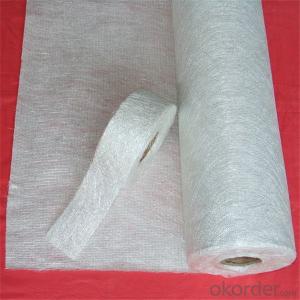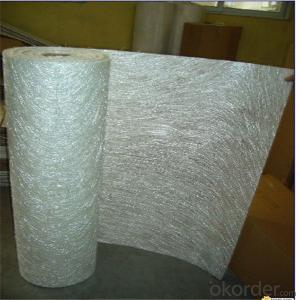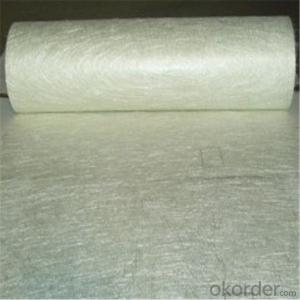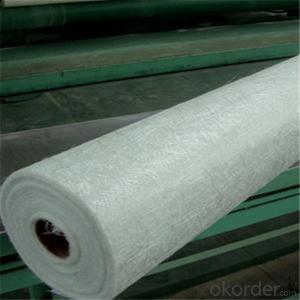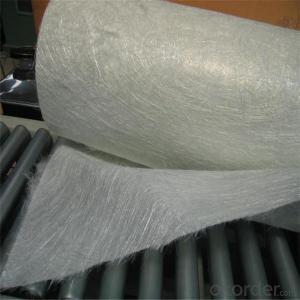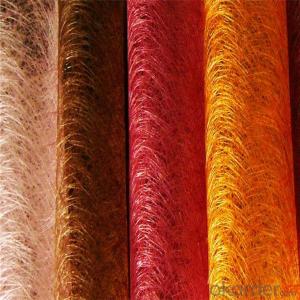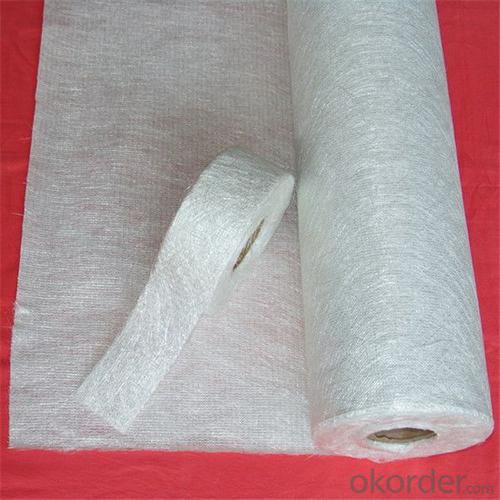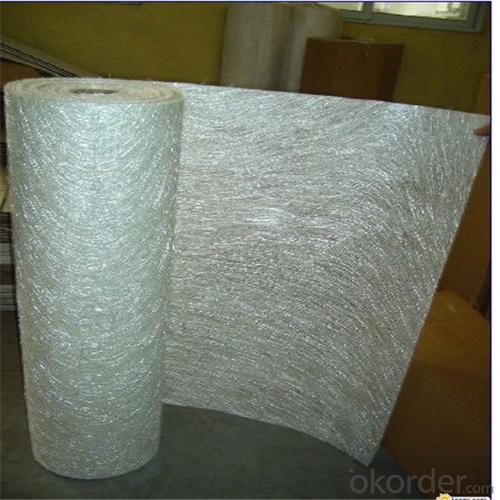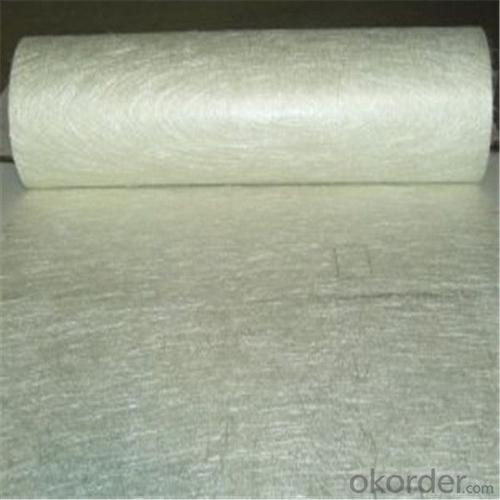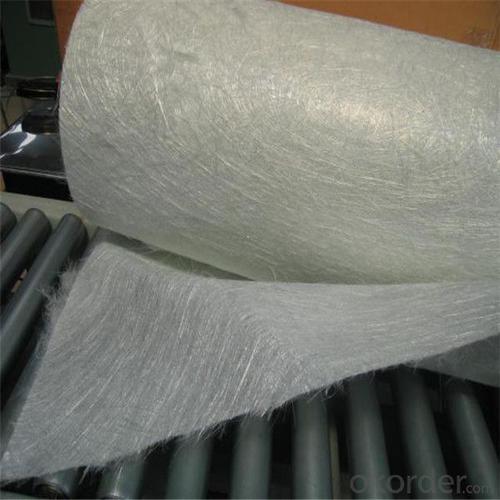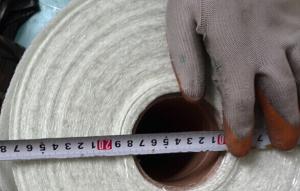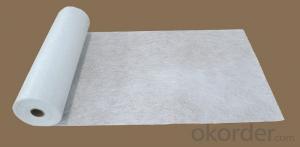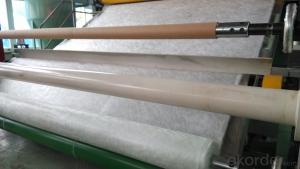Emulison Fiberglass Mat Tissue Chopped Strand Mat
- Loading Port:
- Tianjin
- Payment Terms:
- TT OR LC
- Min Order Qty:
- 100 m.t.
- Supply Capability:
- 20000 m.t./month
OKorder Service Pledge
OKorder Financial Service
You Might Also Like
Quick Details
| Technique: | Chopped Strand Fiberglass Mat (CSM) | Dimensions: | according to customer's request | Mat Type: | Stitch Bonding Chop Mat |
| Fiberglass Type: | E-Glass | Softness: | middle | Place of Origin: | Jiangxi, China (Mainland) |
| Brand Name: | cnbm | Model Number: | CSMEP100,CSMEP120,CSMEP200,etc | Product: | Cooling Tower Building Glass Fiber Fiberglass Chopped Strand Mat(csm) |
| Color: | White | Width: | 1040mm,1250mm,ect. | Area weight: | 225-900g/m2 |
| Application: | filament winding,panpel,ect |
Packaging & Delivery
| Packaging Details: | Each roll in one polybag then to an export carton. |
| Delivery Detail: | Within 18 days after confirm order |
Fiberglass Chopped strand mat
Powder Strand Mats Product Features:
1) Uniform density ensures consistent fiberglass content and mechanical properties of the composites products.
2)Uniform powder distribution ensures good mat integrity, little loose fibers and small roll diameter.
3) Excellent flexibility ensures good mold ability with no spring back at sharp angles.
4)Fast and consistent wet-out speed in resins and rapid air lease reduce resin consumption and production cost and enhances productivity and mechanical properties of the end products.
5)The composite products have high dry and wet tensile strength and good transparency.
Picture
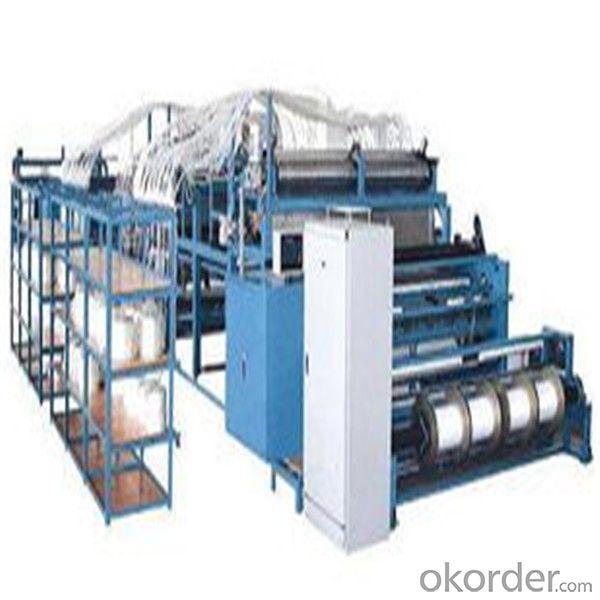
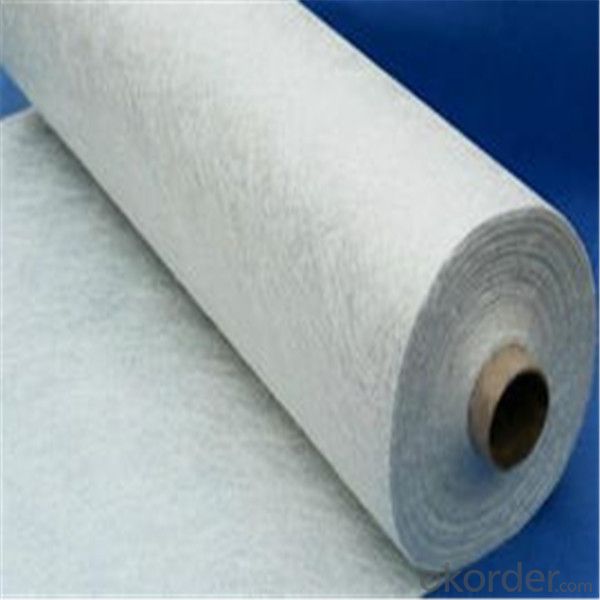
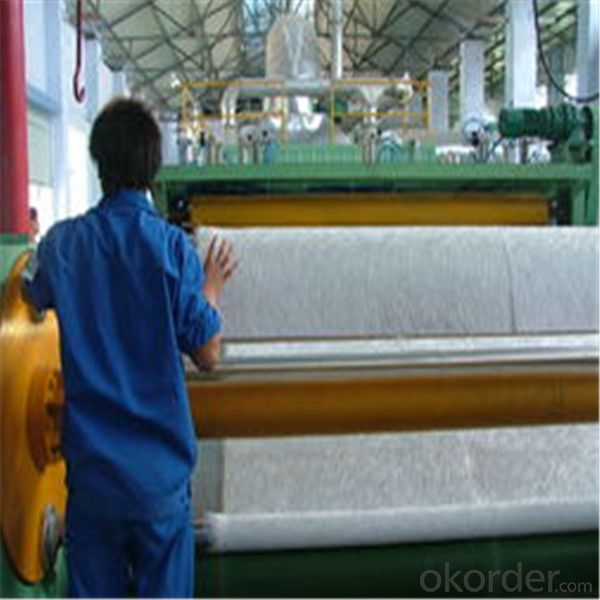
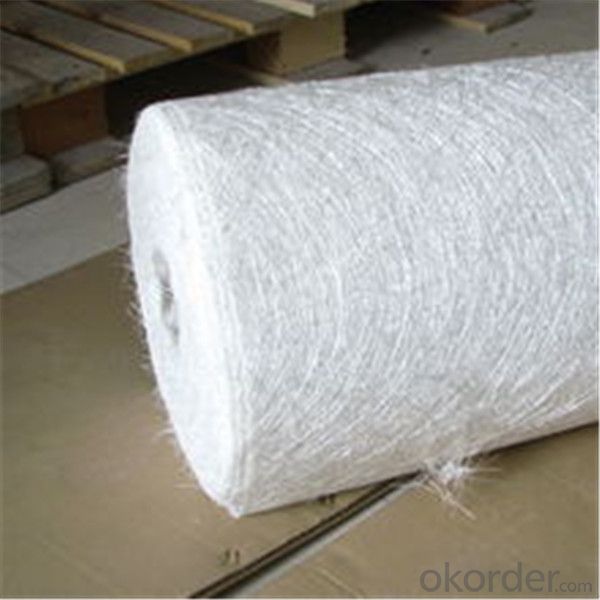
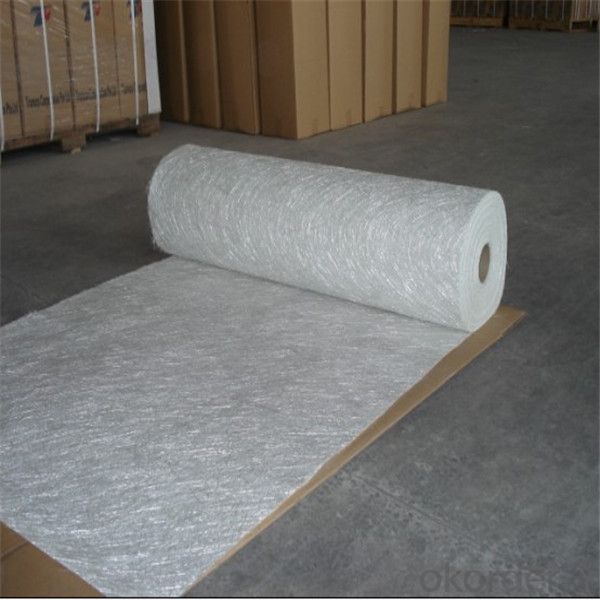
- Q: What is the impact resistance of fiberglass mat tissue at high temperatures?
- The impact resistance of fiberglass mat tissue can vary at high temperatures, depending on factors like its specific composition, the manufacturing process, and the testing conditions. In general, fiberglass mat tissue has good impact resistance at high temperatures due to the inherent strength and durability of fiberglass materials. Fiberglass is recognized for its excellent mechanical properties, including high tensile strength and stiffness, which contribute to its overall impact resistance. Typically, fiberglass mat tissue maintains its structural integrity and can withstand impact without cracking or breaking at high temperatures. This is because the fiberglass fibers are designed to endure high temperatures and do not easily soften or deform. However, it's worth noting that the impact resistance of fiberglass mat tissue can be affected by other factors like the presence of additives or binders used during manufacturing. Some additives or binders may decrease impact resistance or make the tissue more prone to damage at high temperatures. To determine the specific impact resistance of a particular fiberglass mat tissue at high temperatures, it's crucial to refer to the manufacturer's specifications or conduct specific tests under controlled conditions. These tests can provide more precise information on how the material will perform under impact at elevated temperatures.
- Q: Is fiberglass mat tissue easy to install?
- Installing fiberglass mat tissue is relatively easy. This lightweight and flexible material can be easily cut and shaped to fit any surface. It can be applied using different methods, including spraying, rolling, or brushing on adhesive. Moreover, the tissue is self-adhesive, which simplifies the installation process as it readily adheres to the desired surface. Additionally, fiberglass mat tissues are generally designed to resist water and offer excellent insulation, making them a favored choice for various applications. In conclusion, by adequately preparing and following the manufacturer's guidelines, installing fiberglass mat tissue can be a simple and trouble-free task.
- Q: Is fiberglass mat tissue resistant to alkalis?
- Yes, fiberglass mat tissue is resistant to alkalis. It is commonly used in construction and industrial applications where it may come into contact with alkaline substances such as cement or concrete. The fiberglass mat tissue is designed to have a high resistance to alkalis, ensuring its durability and longevity in these environments. This resistance is due to the chemical composition and structure of the fiberglass, which allows it to withstand the corrosive effects of alkalis without degradation. Therefore, fiberglass mat tissue is a reliable choice for projects that involve exposure to alkalis.
- Q: Can fiberglass mat tissue be used for insulation in cryogenic applications?
- Yes, fiberglass mat tissue can be used for insulation in cryogenic applications. It provides excellent thermal insulation properties and can withstand extremely low temperatures commonly found in cryogenic environments.
- Q: Is fiberglass mat tissue resistant to moisture?
- Yes, fiberglass mat tissue is resistant to moisture. Fiberglass mat tissue is made from tightly woven strands of glass fibers, which are then bonded together with a resin. This resin creates a barrier that prevents moisture from penetrating the tissue. As a result, fiberglass mat tissue is highly resistant to moisture and can be used in applications where exposure to water or high humidity is expected. Additionally, the moisture resistance of fiberglass mat tissue helps prevent the growth of mold or mildew, making it a suitable choice for damp environments.
- Q: Is fiberglass mat tissue suitable for railway infrastructure?
- Yes, fiberglass mat tissue is suitable for railway infrastructure. Fiberglass mat tissue is a strong and durable material that offers excellent resistance to corrosion, weathering, and chemical degradation. It is commonly used in the construction industry for reinforcing structures such as bridges, tunnels, and platforms. In the case of railway infrastructure, fiberglass mat tissue can provide several benefits. Firstly, it has high tensile strength, which means it can withstand the heavy loads and vibrations associated with train traffic. This helps to prevent cracking and structural damage, ensuring the longevity and safety of the railway system. Additionally, fiberglass mat tissue is non-conductive, which is a crucial characteristic for railway infrastructure. It helps to prevent the risk of electrical shocks and short circuits, which are common concerns in rail networks. This makes fiberglass mat tissue a reliable choice for railway infrastructure, especially in areas where electrical lines are present. Furthermore, fiberglass mat tissue is lightweight and easy to handle, making it convenient for installation in railway projects. It is also resistant to fire, making it a safe choice for railway infrastructure in terms of fire protection. Overall, fiberglass mat tissue is a suitable material for railway infrastructure due to its strength, durability, non-conductive nature, and fire resistance. Its use in railway construction can contribute to the reliability, longevity, and safety of the railway system.
- Q: Does fiberglass mat tissue provide good fire protection?
- No, fiberglass mat tissue does not provide good fire protection.
- Q: How is fiberglass mat tissue manufactured?
- The production of fiberglass mat tissue is accomplished by utilizing glass fibers and a binder material in a multi-step procedure. Firstly, glass fibers are manufactured by melting raw materials like silica sand, limestone, and soda ash in a furnace. The molten glass is then forced through small holes in a spinneret, resulting in the creation of fine strands of glass fibers. Once the glass fibers are generated, they are gathered and formed into a continuous mat. This is achieved by passing the fibers through a sequence of rollers or air jets that align and compress them into a uniform sheet. At this stage, the mat retains a loose and fragile structure. To provide the fiberglass mat tissue with strength and stability, a binder material is introduced. This binder can be a resin or a mixture of resins and additives. Typically, the binder is sprayed onto the mat, allowing it to permeate and bond with the glass fibers. This process is referred to as wet-laid manufacturing. Following the application of the binder, the fiberglass mat tissue undergoes a curing process. Depending on the specific requirements of the product, this may involve the application of heat, pressure, or both. The purpose of the curing process is to solidify the binder and ensure a secure bond with the glass fibers, resulting in a robust and long-lasting mat. Once the curing process is completed, excess moisture is removed from the fiberglass mat tissue through drying. It is then trimmed and cut to the desired dimensions. Depending on its intended use, the mat may undergo further treatments like surface coatings or laminations to enhance its performance properties. In summary, the manufacturing process of fiberglass mat tissue encompasses the production of glass fibers, the formation of a continuous mat, the addition of a binder material, curing, drying, and final processing. This comprehensive procedure guarantees that the resulting fiberglass mat tissue possesses strength, flexibility, and suitability for a diverse range of applications such as insulation, reinforcement in composites, or roofing materials.
- Q: How is fiberglass mat tissue used in the automotive industry?
- Fiberglass mat tissue is extensively used in the automotive industry for various purposes. It is a versatile material that offers numerous benefits, making it an ideal choice for several applications. One of the primary uses of fiberglass mat tissue in the automotive industry is for reinforcing composite materials. It is commonly used as a reinforcement layer in the manufacturing of parts such as car panels, hoods, roofs, and doors. The fiberglass mat tissue enhances the structural integrity of these components, making them more robust and resistant to impact and external forces. This reinforcement property helps in improving the overall safety of the vehicle. Additionally, fiberglass mat tissue is also used in the automotive industry for sound insulation purposes. The material has excellent sound absorption properties, which helps in reducing noise and vibrations within the vehicle. By installing fiberglass mat tissue in various areas such as the floor, doors, and roof, automakers can significantly enhance the overall acoustic comfort of the vehicle, providing a quieter and more enjoyable driving experience. Furthermore, fiberglass mat tissue is also utilized in the automotive industry for thermal insulation. The material acts as a barrier against heat transfer, helping to regulate the temperature inside the vehicle. By incorporating fiberglass mat tissue in areas such as the engine compartment, exhaust system, and undercarriage, automakers can effectively insulate the vehicle from excessive heat, preventing overheating and ensuring optimal performance. In summary, fiberglass mat tissue is extensively used in the automotive industry for reinforcement, sound insulation, and thermal insulation purposes. Its versatile properties make it an indispensable material in the manufacturing of vehicles, contributing to improved safety, comfort, and performance.
- Q: Can fiberglass mat tissue be used for reinforcing concrete?
- Yes, fiberglass mat tissue can be used for reinforcing concrete. Fiberglass mat tissue is a lightweight and flexible material that is often used in construction projects to enhance the strength and durability of concrete structures. It can be embedded within the concrete to provide additional reinforcement and prevent cracks from forming over time. The fiberglass mat tissue is typically made from high-quality glass fibers that are woven together to form a strong and stable material. Its excellent tensile strength and resistance to corrosion make it an ideal choice for reinforcing concrete and improving its overall performance. Whether it is used in sidewalks, driveways, or other concrete structures, fiberglass mat tissue can significantly enhance the strength and longevity of the concrete.
Send your message to us
Emulison Fiberglass Mat Tissue Chopped Strand Mat
- Loading Port:
- Tianjin
- Payment Terms:
- TT OR LC
- Min Order Qty:
- 100 m.t.
- Supply Capability:
- 20000 m.t./month
OKorder Service Pledge
OKorder Financial Service
Similar products
Hot products
Hot Searches
Related keywords
